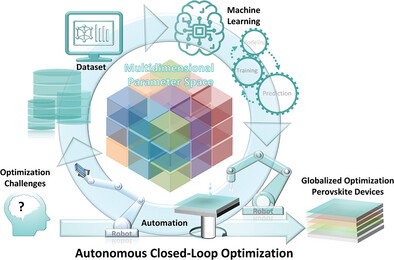Autonomous Optimization of Air-Processed Perovskite Solar Cell in a Multidimensional Parameter Space
Zhang, J., Le Corre, V.M., Wu, J., Du, T., Osterrieder, T., Zhang, K., Zhang, H., Lüer, L., Hauch, J., Brabec, C.J.
Advanced Energy Materials (2025): 2404957
Traditional optimization methods often face challenges in exploring complex process parameter spaces, which typically result in suboptimal local maxima. Here an autonomous framework driven by a machine learning (ML)-guided automated platform is introduced to optimize the fabrication conditions of additive- and passivation-free perovskite solar cells (PSCs) under ambient conditions. By effectively exploring a 6D parameter space, this method identifies five parameter sets achieving efficiencies above 23%, with a peak efficiency of 23.7% with limited experimental budgets. Feature importance analysis indicates that the rotation speeds during the first and second steps of perovskite processing are the most influential factors affecting device performance, thereby meriting prioritization in the optimization efforts. These results demonstrate the exceptional capability of the autonomous framework in addressing complex process parameter optimization challenges and its potential to advance perovskite photovoltaic technology. Beyond PSCs, this work provides a reliable and comprehensive strategy for optimizing solution-processed semiconductors and highlights the broader applications of autonomous methodologies in materials science

